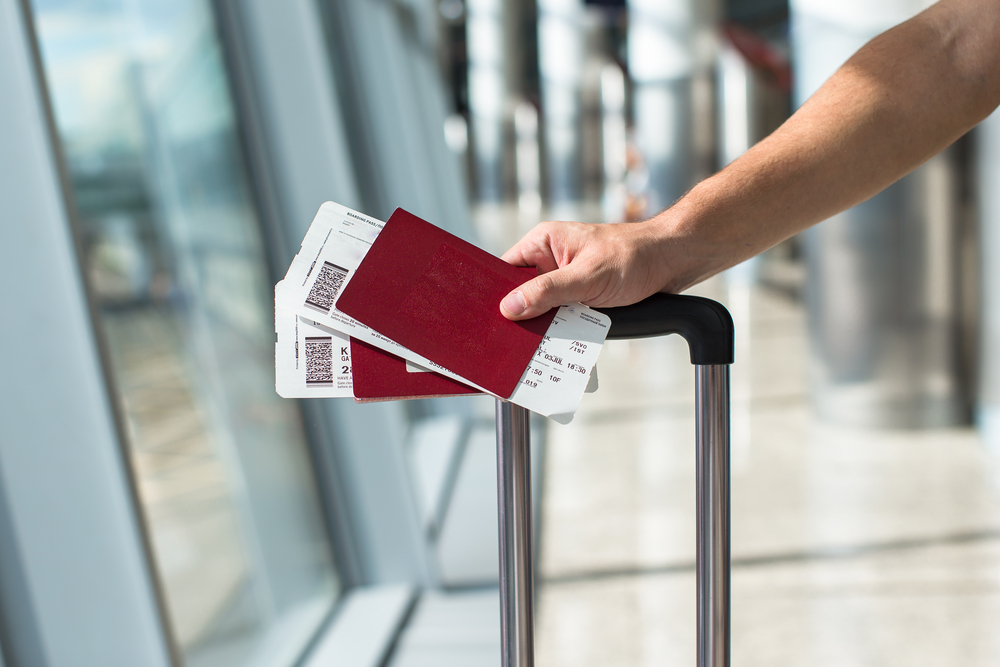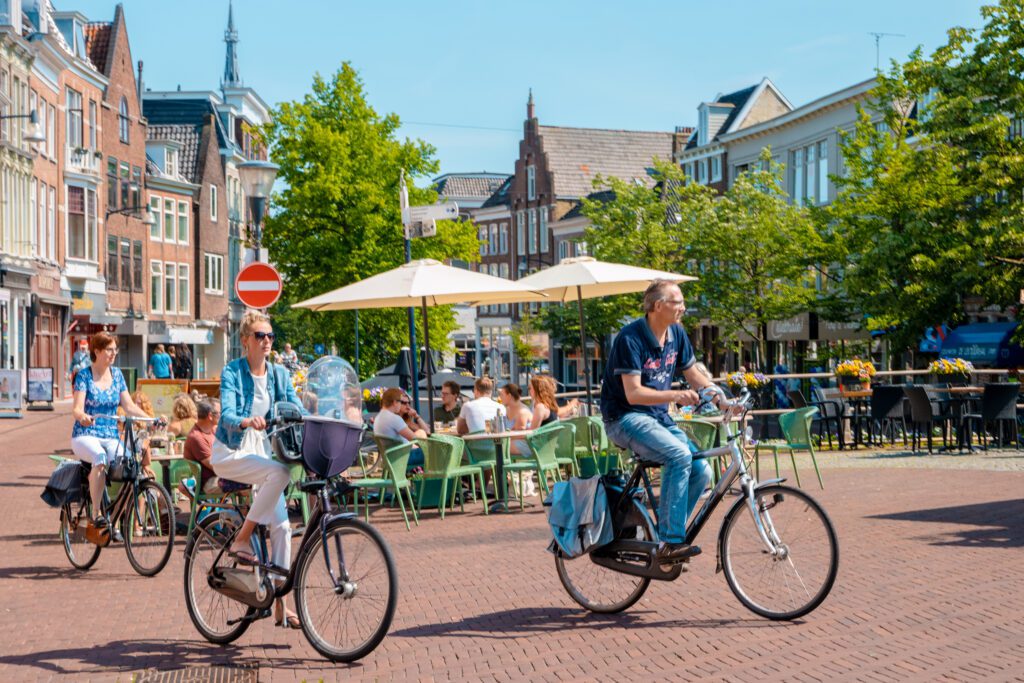Before starting your new Dutch life, you’ll likely need to arrange a visa or residence permit to live in the Netherlands.
With its entrancing fields of tulips, delicious stroopwafels, and healthy work-life balance, the Netherlands is definitely one of the best countries to visit or live in.
However, moving into a new country isn’t as simple as following your heart. Like opening a bank account or filing your taxes, there are some legal requirements that you’ll need to tackle before the IND (Department of Immigration) hands your visa or residence permit to you.
We’ve been there, so here’s our full guide to walk you through the process. Veel success (best of luck)!
Do I need a visa to travel to the Netherlands?
The first question is always: Are you an EU/EEA or Swiss citizen?
If you’re lucky enough to have a passport from an EU/EEA country or Switzerland, then the process is as easy as pie.

This is because EU/EEA/Swiss residents do not need a visa to travel or live in the Netherlands.
What are EU or EEA countries?
EU countries include Austria, Belgium, Bulgaria, Croatia, Republic of Cyprus, Czech Republic, Denmark, Estonia, Finland, France, Germany, Greece, Hungary, Ireland, Italy, Latvia, Lithuania, Luxembourg, Malta, Poland, Portugal, Romania, Slovakia, Slovenia, Spain and Sweden.
EEA countries include the EU member states, plus Iceland, Liechtenstein, and Norway.
Wait… but what if you aren’t in that club? Unfortunately, almost everyone else is required to apply (or be exempt) for a Dutch visa or residence permit.
Not sure if you need a visa to visit or live in the Netherlands? If in doubt, use the government’s visa requirement check.
Types of Dutch visas and residence permits
Like flavours of stroopwafel, visas to the Netherlands come in many different forms. They typically depend on your reason for travelling and country of origin, and have varying legal and financial requirements.
Keen as a bean to start your journey, but don’t quite know where to start? Let’s run through the most common types of visas and residence permits!
📸 Visas for tourism in the Netherlands
If you’ve always dreamed of vacationing amongst the tulips and windmills, you will likely need to apply for a tourist visa.
The Netherlands doesn’t offer its own tourism visas, as it’s a part of the Schengen Area. The Schengen Area is a group of European countries that have no physical borders.

Once you have permission to visit the Schengen Area, you can visit the Netherlands too!
Countries in the Schengen Area
Schengen Area countries include Austria, Belgium, Croatia, Czech Republic, Denmark (except the Faroe Islands and Greenland), Estonia, Finland, France (except French Guyana, Guadeloupe, Martinique, and Réunion), Germany, Greece, Hungary, Iceland, Italy, Latvia, Liechtenstein, Lithuania, Luxembourg, Malta, the Netherlands, Norway (except Spitsbergen), Poland, Portugal (including the Azores and Madeira), Slovenia, Slovakia, Spain (including the Balearic and Canary Islands), Sweden, and Switzerland.
In addition to this, citizens from some countries (like Australia, Canada, Ireland, the UK, the US, and more) are visa-exempt for the Schengen area — which means that their citizens do not require a tourist visa to travel to the Netherlands.
However, from mid-2025, these citizens will need to have a European Travel Information and Authorisation System (ETIAS) travel authorisation. It’s expected that the authorisation process will take just a few minutes to process.
For longer stays, citizens from these countries are typically required to obtain a residence permit.
Citizens who do not need a tourist visa to visit the Netherlands
Albania, Andorra, Antigua and Barbuda, Argentina, Australia, Bahamas, Barbados, Bosnia and Herzegovina, Brazil, Brunei, Canada, Chile, Colombia, Costa Rica, Dominica, El Salvador, North Macedonia, Georgia, Grenada, Guatemala, Holy See (Vatican City State), Honduras, Hungary, Iceland, Ireland, Israel, Italy, Japan, Kiribati, Latvia, Liechtenstein, Lithuania Luxembourg, North Macedonia, Malaysia, Malta, Marshall Islands, Mauritius, Mexico, Micronesia, Moldova, Monaco, Monaco, Montenegro, New Zealand, Nicaragua, Norway, Palau, Panama, Paraguay, Peru, Poland, Portugal, Romania, Saint Kitts and Nevis, Saint Lucia, Saint Vincent and the Grenadines, Samoa, San Marino, Serbia, Seychelles, Singapore, Slovakia, Slovenia, Solomon Islands, South Korea, Spain, Sweden, Switzerland, Tonga, Trinidad and Tobago, Tuvalu, Ukraine, United Arab Emirates, United Kingdom, United States, Uruguay, Vanuatu, and Venezuela.
For those that are not included in the lists above, you’ll need a short-term visa. The most popular options are:
Short-stay Schengen visa (C-type): Best for tourists
A short-stay C-type Schengen visa allows you to travel within the Schengen Area for a maximum of 90 days.
This visa is valid for a 180-day period and is only intended for tourism (essentially, you are not permitted to work in any of the Schengen countries).
Unfortunately, you can’t apply for a residence permit whilst on a short-stay Schengen visa.

In addition to this, a C-type visa is only valid for a single entry to and exit from the Schengen Area. In other words, you cannot leave and enter the Schengen Area multiple times whilst on this visa.
Multiple-entry Schengen visas: Best for travel flexibility
C-type Schengen visas are single-entry visas, which only permit one entry to and exit from the Schengen Area.
In comparison, a multiple-entry visa allows you to leave and re-enter the Schengen Area multiple times.
Like the short-stay Schengen visa, the maximum time you are allowed to remain in the zone is 90 days.
Visas and residence permits to live in the Netherlands
Well, what if you’re in search of a bit more commitment and want a longer stay in the Netherlands? It sounds like you may want to apply for a Dutch residence permit!
READ MORE | Registration in the Netherlands: the complete guide for 2023
There are many different types of residence permits, so let’s walk through some of the most common ones and the steps involved. 👇
Long-stay visas (MVVs): Best first step to a Dutch residence permit
Also known as an authorisation for temporary stay, an MVV is a provisional residence permit granting the right to stay in the Netherlands for up to 90 days.
As an MVV is meant to be the stepping stone to long-stay residence in the Netherlands for most foreigners. To stay longer, you will need to apply for a Dutch residence permit within your 90-days.
Want special treatment? Residents of Australia, Canada, Japan, Monaco, New Zealand, Vatican City, United States, and South Korea can apply for Dutch residence permits without needing an MVV first.
Student residence permit: Best for international students
If you’re dreaming of studying at a Dutch university or have already applied to one, then you will likely require a student residence permit.

Thankfully, Dutch universities generally help facilitate the visa and residence permit process, so you won’t need to tackle the beast of bureaucracy on your own.
The Dutch student visa process
The visa process for students in the Netherlands can look a bit tricky but don’t stress — tens of thousands of students have navigated it successfully and you can too.
To start, after you’ve confirmed your enrolment in Studielink, the Dutch university system, your university will begin facilitating the visa process.
When approved by the Dutch immigration service, you will then need to collect your MVV from the Dutch embassy in your home country (unless you’re exempt).
You will also need to check the Visa tab of your university account to see what documents they require you to upload.
Many of these documents will need to be sent prior to travelling to the Netherlands (i.e. a copy of your passport and a completed antecedents certificate), but others such as Dutch insurance information and a Dutch bank account can be arranged once you’ve landed.
In general, you will need:
- A copy of your passport or ID
- A bank statement, to indicate you have sufficient money to cover your stay
- An antecedents certificate
- A copy of your insurance policy, with coverage for your entire stay
Once you’ve uploaded all your documents and your university’s visa team has had a chance to approve them, they will send them to the IND for final approval.

Once your documents have been sent to the IND, the approval process can take anywhere from a few business days to several weeks.
When your residence permit has been approved by the IND, you will then need to make an appointment with an IND kantoor (office) near you to have a photograph and biometric information taken for your ID.
This ID will serve as a physical copy of your residence permit.
Residence permits for partners and family (where one person is a Dutch resident)
Found yourself a Dutchie to love? Great! The good news is that a relationship visa is relatively simple to receive.
This visa is primarily for partners, spouses, or foreign family members of Dutch nationals, who are hoping to stay in the Netherlands for longer than 90 days.
Not sure of the steps involved? Let’s have a look!
1. Pass the Civic Integration Abroad Exam
The first step will often involve passing the Civic Integration Abroad Exam, if needed (see below). Costing €150, it comprises three parts: Speaking Skills (in Dutch), Reading Skills (in Dutch), and Knowledge of Dutch Society.
Note: Citizens from certain countries do not need to take this initial exam or apply for an MVV in the next step.
This applies to citizens of an EU/EEA country, Australia, Canada, Japan, Monaco, New Zealand, Vatican City, the UK, the US, South Korea, or Suriname.
2. Apply for an MVV
Once the exam is passed, the foreign national will need to apply for an MVV visa (provisional residence permit).
This must be done within 12 months of receiving the results, as the Civic Integration Exam results are only valid for one year.
3. Apply for a residence permit
With this provisional residence permit, the sponsor can then apply for a proper residence permit for their partner or family member.
For the residence permit, the sponsor will need to meet several additional requirements, as set by the IND.
These will likely include:
- That the sponsor has Dutch nationality or a Dutch residence permit
- Confirming that both you and your partner are over the age of 21 and are in a long-term relationship/legal marriage
- Meeting set income requirements
- Officially declaring that you are your partner/family member’s sponsor
- Confirming that your partner/family member will register at your address
Done and dusted? Gefeliciteerd, you’ve just finished applying for a partner/family residence permit!

These visas are typically valid for five years. However, if the sponsor only has a temporary residence permit, the relationship visa expires at the same time as the sponsor’s permit.
Working holiday residence permit: Best for Dutch work experience
Maybe a cultural exchange permit to the Netherlands sounds like a dream come true, but you also need the funds to support yourself.
We’ve got great news: you might be eligible for a working holiday residence permit!
Like the general cultural exchange residence permit, you’ll need to be between 18 and 30 years of age to apply. You will also need to be a citizen of Argentina, Australia, Canada, Hong Kong, Japan, New Zealand, South Korea, Taiwan, or Uruguay.
As the main purpose of this permit is to experience Dutch culture, applicants can only carry out work to support their stay financially — and not undertake full-time, contractual employment.
In addition to this, this permit is only valid for one year.
Cultural exchange residence permit: Best for experiencing Dutch culture
Have you ever dreamed of living in the Netherlands for up to a year and learning all about Dutch culture and society?

Are you also between 18 to 30 years old and a citizen of Argentina, Australia, Canada, Hong Kong, Japan, New Zealand, South Korea, Taiwan, or Uruguay?
Then you may want to consider a cultural exchange residence permit. 🌷
Because this is a cultural exchange, you are not allowed to work in the Netherlands whilst on this visa.
Residence permit for orientation year: Best for graduates from Dutch universities
If you’re a recent graduate of a Dutch university, you can also apply for an orientation year residence permit.
This Dutch visa will allow you to spend an orientation year (or zoekjaar) in the Netherlands, easing you into one of the world’s most future-facing job markets.
Qualifying for this residence permit will give you free access to the Dutch labour market — meaning that your employer doesn’t need to apply for a work permit for you.
What if you haven’t graduated from a Dutch university, but would still like to take advantage of the zoekjaar visa?

Well, if you possess a foreign diploma (i.e. a degree not provided by a Dutch university), it will need to be assessed by Nuffic (the Dutch organisation for internationalisation in education) before it is approved and your zoekjaar visa is granted.
The only exception to this assessment rule are diplomas from higher education programmes in Flanders (Belgium), which are automatically accepted.
Residence permit for self-employed individuals
Not to be confused with the working holiday residence permit, a residence permit for self-employed individuals is exclusively for freelancers.
Enterprising freelancers from in-demand fields who want to launch their own business in the Netherlands can also apply for a special residence permit for foreign start-ups.
This permit allows you to live in the country for up to one year, learning handy tips and tricks to boost your entrepreneurial skills. 🚀

However, let op: in order to be eligible for this residence permit, you will need to undertake work that will be especially beneficial for the Dutch economy — or completely new to the Netherlands.
Other visas and residence permits
If none of the options above fit your situation, don’t stress! There are also a few more niche visas and residence permits available:
Dutch-American Friendship Treaty: Best for American citizens
If you hold American citizenship and want to work as a freelancer in the Netherlands, you can apply for this residence permit.

The permit is valid for two years, after which it can be renewed for another five years.
However, the IND requires that you invest at least €4500 in your business to be eligible.
Dutch-Japanese Trade Treaty: Best for Japanese citizens
Are you a Japanese citizen that wants to freelance in the Netherlands? Hoera, you can opt for this residence permit.
Like the Dutch-American Friendship Treaty, the Dutch-Japanese Trade Treaty requires you to invest at least €4500 in your business and is valid for two years.
Au pair residence permit: Best for internationals seeking au pair work in the Netherlands
If you’re dying to visit the Netherlands and don’t mind picking up some au pair work along the way, the au pair residence permit might be right up your alley!
You will need to register with an au pair agency, as they will need to apply for this residence permit on your behalf.
However, let op: the requirements for this residence permit can be rather strict.
Some of these requirements include being between 18 and 25 years of age, being registered with a recognised au pair agency, and working for a host family that meets the IND’s income requirements.
How to apply for a visa or permit in the Netherlands
If you’ve made it this far, you’re probably champing at the bit to arrange your very own Dutch visa or residence permit.

There are two ways to go about this: either arranging the visa/permit yourself or having a sponsor do it for you.
Applying for a visa/permit yourself
Although the process of applying for a Dutch visa or residence permit can seem daunting at first, it’s thankfully quite straightforward.
Requirements for a Dutch residence permit
To apply for a Dutch residence permit, you will need to provide the IND with several important documents. This can all be carried out online, so don’t stress about needing to head to a Dutch immigration office.
These documents include:
- Bank statements to indicate that you have sufficient funds to cover your living expenses, insurance, and other costs during your stay
- A copy of your passport or ID that will remain valid throughout your stay
- Health insurance coverage for the full duration of your stay
- A completed antecedents certificate
Having your sponsor apply for a visa/permit on your behalf
In certain situations, like for when you’re applying for a visa to reunite with your partner of family, your “sponsor” will need to apply for your visa on your behallf.

Requirements for a sponsored Dutch residence permit
If you’re looking to sponsor a foreign national or have a Dutch resident sponsor you, several conditions will need to be met. A sponsor will need to:
- Reside in the Netherlands
- Have a valid BSN (citizen service number)
- Earn at least the minimum gross income
- Fill in a proof of sponsorship (or private accommodation) form
In addition to these conditions, potential sponsors may also have to file certain documents. These can include:
- Proof of identification, such as a copy of their ID/passport/Dutch residence permit
- Proof of employment if you work for a Dutch company, such as a copy of their employment contract, their last three payslips, and an employer’s declaration
- For Dutch freelancers, this can include proof of registration with the KvK (Dutch Chamber of Commerce), a profit and loss statement for their business, and their most recent income tax assessment
What do I do if my visa to the Netherlands has been denied?
Helaas, stuff happens sometimes, and your visa may not meet all the requirements set by the IND.
Whilst this setback can be scary and frustrating, it’s important to remember that you can still lodge an objection to the IND’s decision.
First, write an objection letter that clearly states why you are opposing the IND’s decision. Your letter must also include your name, address, the date of its compilation, and your signature.
Next, enclose the official document you received from the IND with your objection letter and mail it to the IND’s general postal address. That’s it, done and dusted!
However, it’s important that you submit your objection in time. This window of time can vary from 15 to 90 days, depending on which visa you’re applying for, so it’s best to check the official IND website for any queries.
Tip: If you don’t want to face the decision alone, you can also have a lawyer or other legal representative lodge the objection for you.
Whether you’re here to earn a degree, marry the love of your life, or simply tiptoe through the tulips, there’s likely to be a visa/residence permit that’ll allow you to do just that.
You might also be interested in
Are you applying for a Dutch visa or residence permit? Tell us all about your journey in the comments below!
Dutch permits and visas: Frequently asked questions
Permits and visas can be tricky beasts to get one’s head around, even without Dutch bureaucracy muddying the waters.
It’s understandable that you have some questions, so we’ll do our best to clear up some common doubts! 🙌
How do I get a visa to the Netherlands?
In order to get a Dutch visa, you will first need to assess which visa is applicable to your situation, as several of them have different requirements. However, the general process involves applying online and sending several documents to the IND.
What types of visas are available for the Netherlands?
Some common Dutch visas include long-stay (MVV) visas, short-stay Schengen (C) visas, Dutch Caribbean visas, and return visas.
Can I stay in the Netherlands for longer than 90 days?
If you are a non-EU/EEA/Swiss national and aren’t in possession of a valid residence permit, then you are not allowed to reside in the Netherlands for longer than 90 days.
How can I apply for a Dutch residence permit?
In order to obtain a Dutch residence permit, you will need to first apply for a residence permit with the IND.
They will then request certain documents from you. These can include bank statements to indicate you have sufficient funds, a copy of your valid passport or ID, a completed antecedents form, and health coverage for the full duration of your stay.

[…] you a non-EU national, then you better read this – you’ve got a lot more legal stuff to sort out. […]
[…] Netherlands…..oh and P.S. Our other guides will help you with things such as: Sorting your permit, registration in the Netherlands (once you’ve found your humble abode), sending your money […]
[…] insurances that you can take out, however, you can only apply if you do not have a permanent residence permit, you do not live in a reception facility for asylum seekers and of course, you don’t already […]
Once my 90 days completed in Schengen visa can i apply MVV immediately